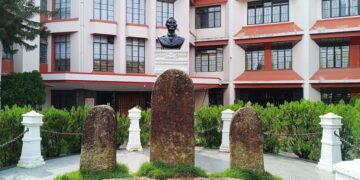The annual 100 Drums Wangala Festival began today at the Wangala A’dam, Chibragre in West Garo Hills with the inauguration of the Nokpante and Nokmong or Noka’chik.
Nokpante is a bachelor’s dormitory, where young Garo men live and learn life skills for their future life. Noka’chik is a Garo traditional house built by using bamboo structure on wooden post which is about 10 to 45 metres in length. It has a living room called dongrama, a fireplace, etc.
These were constructed recently at Wangala A’dam as part of the various infrastructure developments, which are taking place in phase manner in order to upgrade the Garo Heritage Village.
The dormitory and the traditional house are aimed to facilitate researchers for their research related work in future.
Expressing his appreciation and gratitude to the members of the Wangala Committee, Deputy Commissioner Jagdish Chelani who attended the inauguration said the Garo culture has more to showcase to the world. He called for promotion of local culture to attract many tourists from other states and beyond and hoped that these assets would reflect the local beliefs and customs of the Garo culture.
Chairman of the Wangala festival, Ronald Rikman Sangma said the festival is being organised here at the permanent site after a gap of a year. He said that the celebration at the site is still at the initial stage and more developmental works will be undertaken in the days to come.
He said that Wangala is a pride of every Garos since it is celebrated with a view to preserve and showcase the rich culture and traditions of the community. He said the traditions are unique and should be preserved for our future generations and expressed gratitude to the central and state governments for providing financial assistance.
It may be mentioned that the Wangala is the most significant post harvest festival of the Garos generally held in the second week of November every year. It is a thanksgiving ceremony to Misi Saljong also known as Pattigipa Ra∙rongipa (The Great Giver) for having blessed the people with the rich harvest of the season.
The festival which was started in the year 1976 at Asanang, the headquarters of Rongram Development Block near Tura has grown over the years under the patronage of the State government and nurtured by the festival organisation.
On the first day, local products produced by local artisans including entrepreneurs of the region were showcased at the venue.
Indigenous games and sports like Wa∙pong sika, Jakpong Pe∙a, An∙ding O’ka, Rongma Desusa∙a for men, Rongma Chilsusa∙a for women, were organised. A special attraction was a performance by OPATA and ASA, NEHU, Tura Campus.
A master chef competition cum indigenous slow food competition known as Brenga (which is cooked in bamboo tubes) and We∙tepa (which is steamed on low fire by wrapping with banana leaves) was also held.
In the Tug of War competition, Rongkhon team emerged the winner while All Garo Hills MeECL team bagged the runners up trophy.
Folk song competitions, Rugala, Chachat So∙a, and rhythm of 100 drums will also be held during the three-day festival.
























